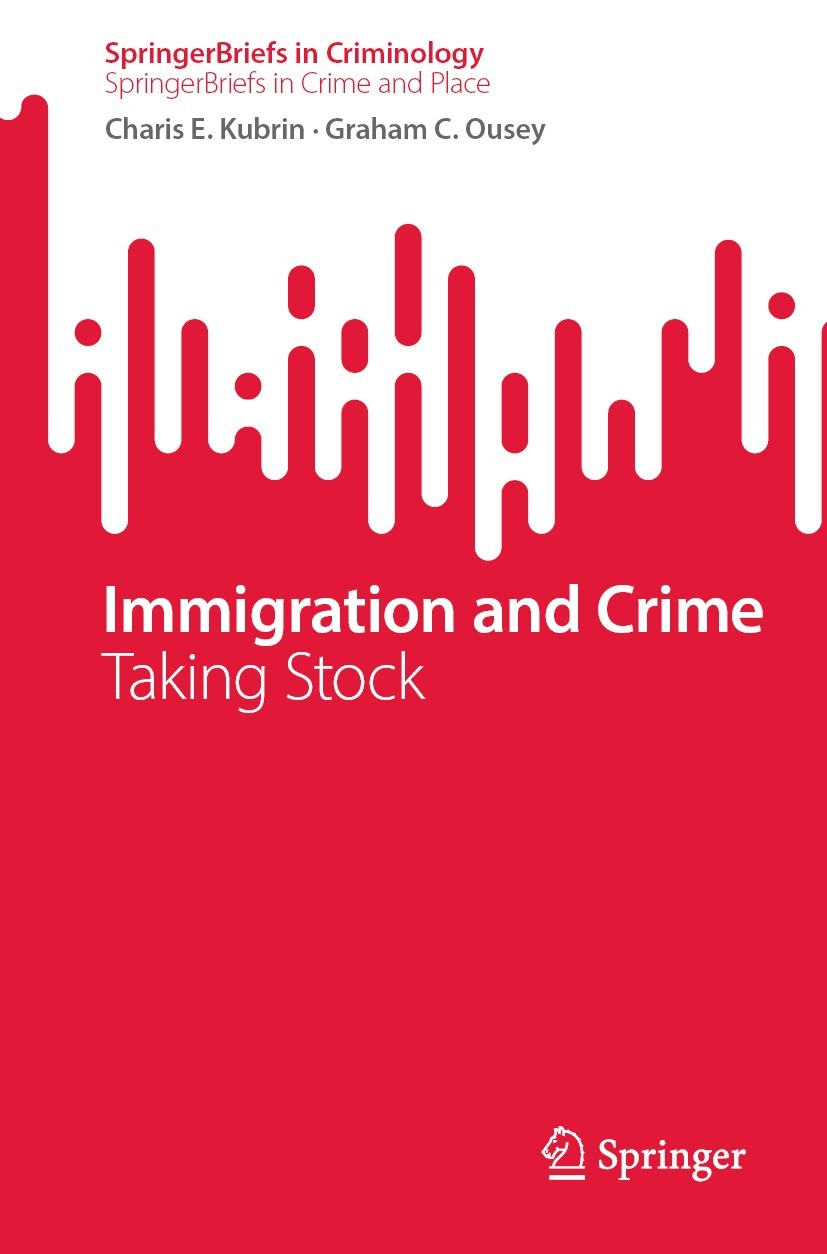
New book amplifies Charis Kubrin’s research of misunderstood topic
When you have devoted nearly two decades to studying immigration and crime, what do you do with all the knowledge you have gained? If you are Charis Kubrin, you put it in a book. The title of the UC Irvine criminology, law and society professor’s latest book says it all: Immigration and Crime: Taking Stock.
 Kubrin and co-author Graham Ousey, a William & Mary sociology professor with whom the UCI criminologist has conducted most of her crime and immigration research, use the February 2023 Springer release to provide a broad overview of the immigration-crime link, including the rise of policies and practices reflecting so-called “crimmigration,” or the broader integration of civil immigration enforcement and the criminal justice system.
Kubrin and co-author Graham Ousey, a William & Mary sociology professor with whom the UCI criminologist has conducted most of her crime and immigration research, use the February 2023 Springer release to provide a broad overview of the immigration-crime link, including the rise of policies and practices reflecting so-called “crimmigration,” or the broader integration of civil immigration enforcement and the criminal justice system.
While Kubrin and Ousey studied reams of scholarly research, they did not allow their book to get bogged down, presenting punchy chapters on theories, data and the collateral consequences of policies informed by false notions on immigration and crime.
Why now?
“This is still such a misuderstood issue,” Kubrin said in a recent interview. “There’s still so much rhetoric and moral panic around this issue. We wanted to survey the entire field and literature not just within criminology, but sociology, economics, anthropology, and political science and bring together everything we need to know about this topic.”
Speaking specifically about her book’s fourth chapter, “Immigration and Crime: What We Know and What Remains Unknown,” she says: “On the what-we-know part, that’s where we do an exhaustive review of the entire body of literature – historically, micro level, macro level and everything in between. We’re looking at immigration’s impact on crime. We’re looking at immigrants and offending. We’re looking at different types of crimes. We’re looking at different kinds of immigrants. We’re looking at different historical time periods. It’s pretty much everything you would want to know.
“But we still distill key takeaways from that literature despite the diversity of studies and diversity of historical time periods. And one of those is that, on average, immigrants are less likely to offend relative to their native-born counterparts. And immigration to an area does not bring crime.”
Sadly, real-world consequences have been and continue to be experienced due to misdirected fears, stereotypes and moral panics about crime and immigrants, especially the undocumented, according to Kubrin.
“The implications of that are everything from anti-immigrant lobbyists propelling politicians and other electeds into office with incorrect viewpoints on immigration, to bad policies that end up hurting immigrants, immigrant families and immigrant communities without really boosting public safety as promised,” she says.
False narratives about immigrants committing more crime have also led to job and housing discrimination and a rise in hate crimes, Kubrin notes.
Donald Trump was able to whip up enough support to win the White House by drawing connections between undocumented immigrants and crime, and Californians have been regularly exposed to anti-immigrant voter propositions sponsored by members of Trump’s Republican Party, but Kubrin is quick to mention that Democrats have also historically exploited the issue. For instance, there were so many deportations under President Barack Obama that he was nicknamed “The Deporter in Chief.”
Despite immigrants’ role as a bipartisan punching bag, Kubrin is hopeful about the future.
“Public perception, while still problematic and faulty, is shifting,” she says. “It’s slow, but it’s shifting. You would be hard pressed to find a reporter out there who is doing due diligence, who is recording statistics, arguing that immigration leads to higher crime rates. There’s a ways to go but, if you look at some public perception and polling data, while it’s still bad, it’s getting less worse.”
A sign of this is at the state-government level, “where states like California are becoming sanctuary states,” says Kubrin.
“I've spoken with police in California, and they get it. They get it because they’re policing immigrant communities. And most people in those communities are law abiding. They want the best. They want to work with the police, and crimmigration policies and practices not only don't help public safety, but they make it hard.”
— Matt Coker